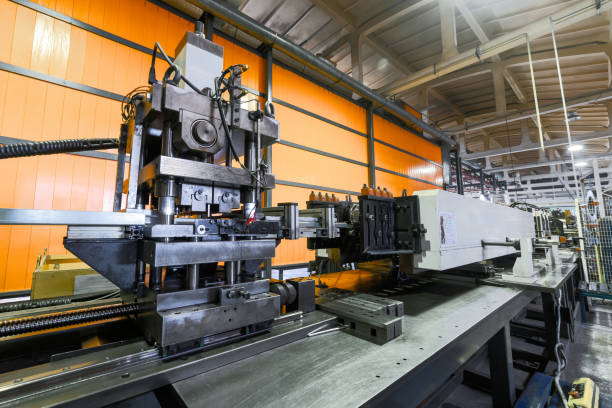Efficient solutions for heavy-duty industrial operations
Industrial machinery represents the backbone of modern manufacturing and production facilities worldwide. These powerful tools and equipment are designed to handle demanding tasks that require precision, strength, and reliability in challenging environments. As industries evolve to meet increasing production demands while managing operational costs, the need for efficient industrial machine solutions becomes paramount. Today's industrial equipment combines innovative technologies with robust engineering to deliver performance that drives productivity across various sectors including manufacturing, construction, mining, and logistics.

Industrial Machines Built for Performance and Durability
Industrial machines function as the powerhouse of manufacturing facilities, often operating continuously for extended periods. This demanding operational requirement makes durability one of the most critical factors in industrial equipment design. Modern industrial machinery is constructed using high-grade materials like hardened steel, specialized alloys, and advanced composites that can withstand extreme conditions including high temperatures, chemical exposure, and constant vibration.
Performance-focused engineering goes beyond mere mechanical strength. Today’s industrial equipment incorporates sophisticated monitoring systems that track operational metrics in real-time, allowing for predictive maintenance rather than reactive repairs. This approach significantly reduces downtime by identifying potential issues before they cause equipment failure. Additionally, many manufacturers now implement modular designs that facilitate faster part replacements and upgrades, further enhancing the longevity of industrial machines.
Optimize Production Processes with Advanced Machinery
The integration of advanced technologies has revolutionized industrial machinery capabilities. Automation and robotics have transformed production lines, allowing for greater precision, consistency, and throughput than ever before. Computer Numerical Control (CNC) machines can execute complex operations with micron-level accuracy, while collaborative robots work alongside human operators to handle repetitive or physically demanding tasks.
Data analytics represents another significant advancement in industrial machine optimization. Modern equipment collects vast amounts of operational data that can be analyzed to identify inefficiencies and opportunities for improvement. Machine learning algorithms can process this information to optimize parameters automatically, resulting in reduced waste, lower energy consumption, and improved product quality. Additionally, Internet of Things (IoT) connectivity enables remote monitoring and control of industrial operations, providing managers with unprecedented visibility into their production processes regardless of physical location.
Reliable Equipment for Manufacturing and Industrial Needs
Reliability in industrial equipment directly impacts bottom-line business results. Even brief periods of unexpected downtime can result in significant production losses and increased operational costs. Top-tier industrial machine manufacturers address this challenge by implementing comprehensive quality assurance processes throughout the design and manufacturing stages. This includes extensive testing under simulated real-world conditions to ensure equipment can withstand the demands of industrial environments.
Maintenance requirements represent another crucial reliability factor. Forward-thinking industrial equipment designs incorporate features that simplify maintenance procedures, such as easily accessible components, standardized parts, and clear diagnostic systems. Additionally, many manufacturers now offer service agreements that include regular preventive maintenance visits, technical support, and expedited repair services. These comprehensive support packages help industrial operations maintain consistent production levels while extending the useful lifespan of their equipment investments.
Customization Options for Specific Industrial Applications
While standardized industrial machines offer excellent performance for general applications, many industrial processes require specialized solutions. Leading manufacturers recognize this need and provide extensive customization options to address specific operational requirements. Custom configurations might include specialized tooling, modified control systems, or adapted physical dimensions to fit existing production layouts.
Industries such as pharmaceutical manufacturing, aerospace component production, and semiconductor fabrication often require equipment that meets extremely specific parameters. In these scenarios, manufacturers can develop purpose-built industrial machines that incorporate specialized materials, enhanced precision capabilities, or additional safety features. This customization flexibility allows operations managers to select equipment that perfectly matches their production needs rather than adapting their processes to accommodate off-the-shelf machinery.
Energy Efficiency in Modern Industrial Equipment
As energy costs continue to rise and environmental regulations become more stringent, energy efficiency has emerged as a critical consideration in industrial machine selection. Modern industrial equipment incorporates numerous features designed to minimize energy consumption while maintaining high performance. Variable frequency drives adjust motor speeds based on actual load requirements, high-efficiency electric motors convert more power to mechanical energy, and advanced insulation materials reduce heat loss in thermal processes.
Some manufacturers have implemented regenerative systems that capture and reuse energy that would otherwise be wasted. For example, braking energy in large industrial equipment can be converted back to electrical power and returned to the grid instead of being dissipated as heat. Additionally, smart power management systems can optimize energy usage across multiple machines by coordinating operations and minimizing peak power demands. These energy-efficient features not only reduce operational costs but also help companies meet sustainability goals and comply with environmental regulations.
Industrial Machine Provider Comparison
| Provider | Specialization | Key Features | Typical Applications |
|---|---|---|---|
| Siemens | Automation and control systems | Industry 4.0 integration, digital twin capabilities | Automotive manufacturing, process industries |
| Caterpillar | Heavy equipment and power systems | Rugged design, comprehensive service network | Construction, mining, material handling |
| ABB | Robotics and motion control | High precision automation, energy efficiency | Electronics assembly, food packaging |
| Mitsubishi Electric | CNC and factory automation | Advanced predictive maintenance, compact designs | Precision machining, industrial robotics |
| Fanuc | Industrial robots and CNC systems | Reliability, long operational life, minimal maintenance | Aerospace manufacturing, automotive assembly |
Prices, rates, or cost estimates mentioned in this article are based on the latest available information but may change over time. Independent research is advised before making financial decisions.
Future Trends in Industrial Machinery Development
The industrial machine landscape continues to evolve with emerging technologies shaping the next generation of equipment. Additive manufacturing (3D printing) capabilities are being integrated into production lines, allowing for on-demand creation of complex components and reducing inventory requirements. Augmented reality interfaces enable operators to visualize machine data overlaid on physical equipment, simplifying troubleshooting and maintenance procedures.
Artificial intelligence represents perhaps the most transformative technology for industrial machinery. AI-powered systems can optimize production parameters in real-time based on changing conditions, predict maintenance needs with increasing accuracy, and identify quality issues before they affect finished products. As these technologies mature and become more widely implemented, industrial operations will benefit from unprecedented levels of efficiency, flexibility, and reliability in their equipment investments.
Industrial machines remain the foundation of modern production capabilities, with continuous advancements driving improvements across all aspects of manufacturing and heavy industrial operations. By selecting equipment that combines performance, durability, and technological sophistication, companies can position themselves for sustainable productivity gains in increasingly competitive markets.




